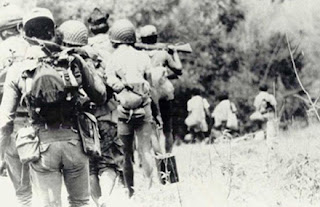Tortured Timor still bears wounds 40 years after Indonesia’s invasion.
Forty years has come and gone since East Timor was invaded by Indonesia’s military. On 7 December 1975 Jakarta commenced an occupation of the tiny island that would last 24 years, finally ending in 1999.
After a long struggle against a brutal regime, East Timor’s people decided their own fate through the ballot box, with a referendum on independence held under the watchful eye of the United Nations.
In the aftermath of independence, fully restored in 2002, Indonesia was one of the first countries to install an embassy in East Timor.
But like a cruel reminder of a nightmare past, the compound was the building formerly used by the BIN (Badan Intelijen Negara, or State Intelligence Agency) to torture local Timorese.
These days, those East Timorese who lived under occupation remember their former master through the endless patrols of Indonesian military and Timorese proxies that roamed the country at midnight, and which left mothers screaming for their lost sons and widows mourning for husbands taken away to be ‘schooled’. Many never came home.
Well-known journalist and former Falintil guerrilla, Jose Antonio Belo, once said, ‘to be free, you have to sacrifice.’ It sounds so easy, but in reality it is not that simple.
As a widow once told me, ‘imagine if suffering is a type of meal and you are eating it every day.’
From the moment Indonesia deployed their soldiers and instigated a reign that used terror and torture, East Timor fed on suffering. The atrocities committed by the Indonesian military caused an exaggerated radicalisation within East Timor’s national liberation movement.
Violence against women also became common; it was more hygienic and effective to kill guerrilleros in the womb then in the mountains or the village. Various military doctors sterilised thousands of women, a major contributor to the loss of one-third of the country’s population since the military invasion.
Today, there is a tendency within East Timor’s government to bury the past, with officials rarely mentioning the word ‘invasion’. Instead, the anniversary of the barbaric occupation has a new name; ‘National Mourning Day.’ And so, after many bodies were buried, the politics of language found fertile ground.
According to this way of thinking, what happened was no military invasion, but simply a historical tragedy and the effect of the Cold War. In this way, the invasion is not solely the responsibility of Indonesia’s government but also the international community, which put bilateral ties ahead of the East Timor people, the vast majority of whom lost loved ones during occupation.
Will calls for justice ever be heeded? Most likely not.
This preference for white-washing history is an important wake-up call.
Decolonising East Timor’s history is a rocky road. But it’s important for East Timorese leaders, intellectuals and the whole of society to break the chains of a bitter colonial legacy.
Only then can the nation re-emerge from a historical black hole, and a tortured past.
Ivo Mateus Goncalves is an independent researcher based in Dili, East Timor.

No comments:
Post a Comment